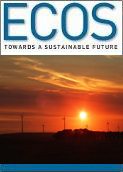
|
Published: 13 August 2012
‘Yes we can’: planetary declaration to seize the moment
In March this year, around 3000 people attended the Planet Under Pressure conference in London. Another 3500 followed the proceedings on-line. The conference inspired the publication of over 400 news articles worldwide in 15 languages and its impact still reverberates in the media, online discussions and policy circles. Mark Stafford Smith, Science Director of CSIRO’s Climate Adaptation Flagship, co-chaired the conference.
Planet Under Pressure 2012: New Knowledge Towards Solutions was the largest gathering of ‘global change’ scientists leading up to the United Nations Conference on Sustainable Development (Rio+20) in June. Though science dominated, the conference attracted others from governments, NGOs, industry and the wider community.
The key messages emerging from the conference were captured in a ‘State of the Planet Declaration’, drafted by Co-Chair Dr Lidia Brito and myself, with the support of the conference Scientific Organizing Committee.
The declaration highlights the urgent need for action. The past two decades of research into planetary-scale changes have demonstrated the colossal scale of the human imprint on the planet. This is epitomised by the concept of the Anthropocene – that human impact has been sufficient to push Earth into a new geological epoch.
The concept is illustrated in an educational website1, to which CSIRO contributed, that was launched at the conference, and a film that was used to open Rio+20. It carries with it a stark conclusion: no longer can sustainable development be viewed as an abstract ideal. Instead, global sustainability must be the bedrock of societies and all nation states. We have to recognise that everyone is responsible for the health of the Earth as a system.
Science has highlighted other game-changing ideas. The declaration noted the extraordinary level of interconnectedness in the Earth as a system, to a degree that was unappreciated 20 years ago. Today’s global society is linked culturally, socially, and economically, as well as through flows of resources and information.
While highly interconnected systems can confer remarkable stability, they are also prone to abrupt change, as shown by the global financial crisis and recent food security issues. We need to consider how to minimise such risks in future by acknowledging and responding – nationally and globally – to these tight economic, social and environmental interdependencies.
But dealing with these interdependencies is challenging. The way we carve up problems into national and sectoral responsibilities means that existing international arrangements are not responding quickly enough to challenges such as climate change and biodiversity loss.
As the late and much lamented Nobel Prize winner Elinor Ostrom said after the conference, ‘Decades of research demonstrate that a variety of overlapping policies at city, sub-national, national, and international levels is more likely to succeed than single, overarching binding agreements. Such an evolutionary approach to policy provides essential safety nets should one or more policies fail.’2
The concept of the Anthropocene challenges us to seek a route to planetary stewardship. This must occur through national action to protect common resources such as the oceans – an area of particular interest to Australia – the atmosphere, water resources and polar regions. All nations must each set goals for sustainable development that will add up to a healthy planet for future generations.
These goals need to link environmental, social and economic issues, within Australia as much as globally. By highlighting these links, we can identify efficiencies and synergies – such as simultaneous benefits for carbon, biodiversity and land productivity from appropriate re-forestation. We can also effectively manage the genuine trade-offs – such as increasing human well-being without increasing resource usage.
The good news is that policymaking is already evolving organically. For example, in the absence of effective national and international legislation to curb greenhouse gases, more and more city leaders across the world are acting to protect their citizens and economies. These moves can be promoted here in Australia, one of the most urbanised countries in the world, and linked to other local movements in natural resource management and regional development.
The State of the Planet declaration has implications for Australia’s research agenda. We have to get better at analysing complex interactions between and within sectors, to ensure a sustainable future for our nation and in our aid contributions to the rest of the world.
This is a challenge for scientists, just as it is for policymakers, requiring us to better communicate and integrate our efforts across sectors and between natural and social sciences and the humanities. Nevertheless, this increasing emphasis on systems thinking will be a critical legacy for the next generation of sustainability scientists.
More information:
1 http://www.anthropocene.info
2 Read more on Elinor Ostrom’s perspective here




